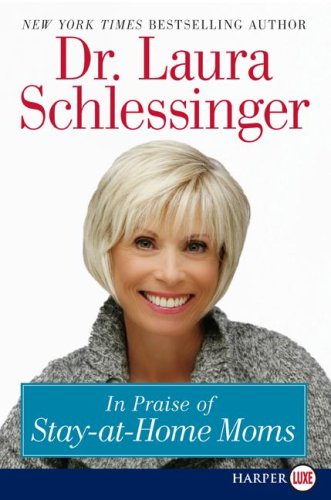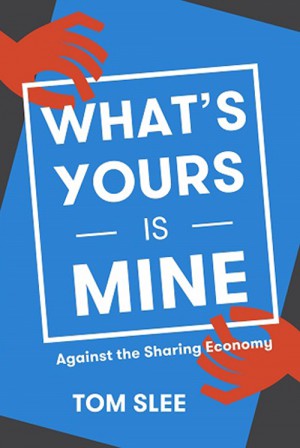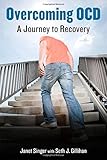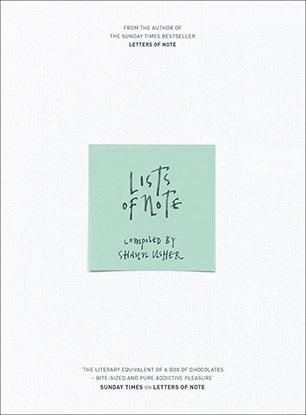 Simpson’s writing style is informal and conversational—the entire book reads like a girlfriend recounting tales of her latest travel adventures over a few cocktails on a night out. The way Simpson tells it, hopping on a plane to an exotic locale is No Big Deal—if you do it right. She stresses that traveling takes some advance budgeting and planning, but when you reach your destination, there’s a lot to be said for taking each day as it comes.
Simpson’s writing style is informal and conversational—the entire book reads like a girlfriend recounting tales of her latest travel adventures over a few cocktails on a night out. The way Simpson tells it, hopping on a plane to an exotic locale is No Big Deal—if you do it right. She stresses that traveling takes some advance budgeting and planning, but when you reach your destination, there’s a lot to be said for taking each day as it comes.
Tag: nonfiction
A review of In Praise of Stay-At-Home Moms by Dr. Laura Schlessinger
 Dr. Laura shows the many great rewards of motherhood through her own personal experiences as well as may other stay-at-home mothers. She and countless other women lovingly remember the smiles their children gave them, the silly behaviors of their children, and regular mother-child moments. Although Dr. Laura admits that there are some moments she wishes have never occurred, she is proud to say that being a mother is her greatest achievement.
Dr. Laura shows the many great rewards of motherhood through her own personal experiences as well as may other stay-at-home mothers. She and countless other women lovingly remember the smiles their children gave them, the silly behaviors of their children, and regular mother-child moments. Although Dr. Laura admits that there are some moments she wishes have never occurred, she is proud to say that being a mother is her greatest achievement.
A review of What’s Yours is Mine by Tom Slee
 In a world where the so-called sharing economy seems to be the wave of the future, Slee’s look at the downside is much needed. He might have written more about the rise of the sharing economy from widespread unemployment, underemployment, and the weakening of the social safety net; however, his clear style, knowledge of his subject, and comprehensive bibliography make What’s Yours is Mine a must-read.
In a world where the so-called sharing economy seems to be the wave of the future, Slee’s look at the downside is much needed. He might have written more about the rise of the sharing economy from widespread unemployment, underemployment, and the weakening of the social safety net; however, his clear style, knowledge of his subject, and comprehensive bibliography make What’s Yours is Mine a must-read.
A review of That Fry Boy by James Fry

A review of We’re Going to Run this City by Stefan Epp-Koop
 “There is something about the audacity, length and size of the General Strike”, writes author Stefan Epp-Koop, “that continues to capture public and scholarly attentions.” The Strike, he says, was not the end of radical politics in Winnipeg, but was “near the beginning.” While focusing on one city’s municipal politics, his work is relevant to the larger history of the left in the 20th century
“There is something about the audacity, length and size of the General Strike”, writes author Stefan Epp-Koop, “that continues to capture public and scholarly attentions.” The Strike, he says, was not the end of radical politics in Winnipeg, but was “near the beginning.” While focusing on one city’s municipal politics, his work is relevant to the larger history of the left in the 20th century
A review of Apostate Englishman by Albert Braz
 Archie Belaney “went native”, in an era when “the cowboys always won.” In the early 20th century, American First Nations people were still regarded as savages with a lust for killing wild animals. On one occasion, in an upscale Toronto hotel while on a lecture tour, Grey Owl was taunted for being Indian. He harmed no one with his deception. Did writing about his own experiences in the forest with animals constitute cultural appropriation? Braz says no.
Archie Belaney “went native”, in an era when “the cowboys always won.” In the early 20th century, American First Nations people were still regarded as savages with a lust for killing wild animals. On one occasion, in an upscale Toronto hotel while on a lecture tour, Grey Owl was taunted for being Indian. He harmed no one with his deception. Did writing about his own experiences in the forest with animals constitute cultural appropriation? Braz says no.
An interview with Billie Bond
 The author of And Then There Was One: A Memoir of My Survival of Childhood Sexual Abuse, Physical Abuse and Mental Illness talks about her new book, about her inspirations, the messages in her book, favourite authors, about the programs she works for, on how it feels to be published, advice for people grappling with similar issues, and lots more.
The author of And Then There Was One: A Memoir of My Survival of Childhood Sexual Abuse, Physical Abuse and Mental Illness talks about her new book, about her inspirations, the messages in her book, favourite authors, about the programs she works for, on how it feels to be published, advice for people grappling with similar issues, and lots more.
A review of Overcoming OCD by Janet Singer and Seth J Gillian
 Not only does Overcoming OCD provide advice, support, and hope to parents, but it also talks to some of the struggles that OCD puts on other siblings, the pitfalls to watch out for in certain types of treatments, things (like enabling) to be careful of, and above all, the importance of remaining positive even when the situation looks intractable.
Not only does Overcoming OCD provide advice, support, and hope to parents, but it also talks to some of the struggles that OCD puts on other siblings, the pitfalls to watch out for in certain types of treatments, things (like enabling) to be careful of, and above all, the importance of remaining positive even when the situation looks intractable.
A review of Black Earth: The Holocaust as History and Warning by Timothy Snyder
To my mind, this is a clear, convincing and rounded account of the Holocaust, the best we have had to date. Snyder makes telling use of Russian, Polish, and Ukrainian sources and he also pays meticulous attention to what the Nazis themselves wrote and said. The result is a context and a narrative in which – and, yes, it sounds almost immoral to say this – the Holocaust makes a kind of sense.
A review of Lists of Note by Sean Usher
 Ultimately, what Lists of Note shows us is that we’re not alone in our desire to tame the rush of information, tasks, and needs that bombards us everyday. Listmaking is both rational and helpful in our chaotic lives and has always been so. More importantly, Lists of Note teaches us that the list, is more than ephemera. It is a key to who we are, and at its best, can actually be a beautiful, and even artistic medium.
Ultimately, what Lists of Note shows us is that we’re not alone in our desire to tame the rush of information, tasks, and needs that bombards us everyday. Listmaking is both rational and helpful in our chaotic lives and has always been so. More importantly, Lists of Note teaches us that the list, is more than ephemera. It is a key to who we are, and at its best, can actually be a beautiful, and even artistic medium.